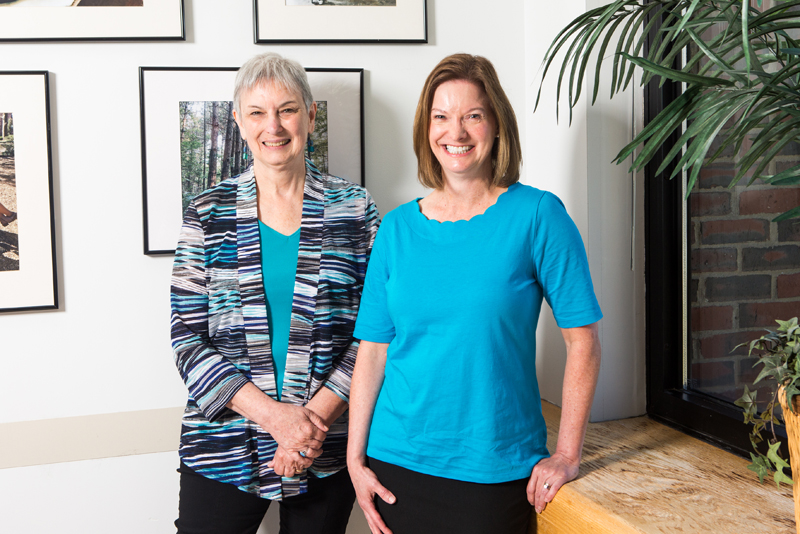Life after High School
BU study supports high schoolers with autism as they transition into adulthood

BU occupational therapy professors Wendy Coster (left) and Gael Orsmond lead the four-year ROAD Ahead Study. Photo by Jake Belcher
Christian Tsetsos, an administrative professional who has Asperger syndrome, credits his mother and an aide-turned-mentor with helping him transition from high school to college and into a full-time career. They made sure he received the necessary support services from his public school system and encouraged him to advocate for himself. Tsetsos believes many students like him aren’t as fortunate when it comes to getting the help they need.
“Even among special education teachers and staff,” says Tsetsos, “there’s a lack of understanding about how best to prepare individuals on the spectrum for post–high school life.”
As a member of the advisory board of the ROAD Ahead Study: Responsibilities of Adulthood, Tsetsos champions other young people with autism* who are on track to graduate high school. The four-year study, led by Boston University College of Health & Rehabilitation Sciences: Sargent College occupational therapy professors Gael Orsmond and Wendy Coster, investigates how educators and related service providers work with high school seniors with autism to prepare them for adult life. The goals are to improve our understanding of common interventions, identify the predictors and markers of adult success, and develop strategies that schools could adopt—and adapt.
For the next stage of the study, the research team, which also includes faculty from Boston University Wheelock College of Education & Human Development and the College of Arts & Sciences’ psychological and brain sciences department, will collect input from parents and their high school student with autism. A longitudinal survey will examine post–school outcomes, including successful participation in post–secondary education or employment and factors associated with these outcomes. The study will gauge how challenges taking over responsibility for daily life tasks at home, school, and in the community may be related to less successful outcomes.
Parents will complete a standardized assessment examining the extent to which their child has assumed responsibility for managing tasks such as making social plans, meeting health and medical treatment requirements, and managing food needs, first during senior year of high school and then again 18 months later.
“At the top of the scale, the child manages all of a task,” says Coster, chair of the occupational therapy department. “That doesn’t mean they do it completely on their own, but it means if they need help, they take responsibility for reaching out to get it.” As part of the ability to self-manage daily life, Orsmond and Coster are interested in the youths’ skills that support functioning; not just the ability to withdraw money from an ATM or balance a checkbook, but to effectively plan and implement a budget.
Children without autism might pick up self-management skills by observing their parents or guardians. Students with autism who have an intellectual disability might learn some of these things in special education classes. But youth with autism who primarily take general education classes seem to be missing out on both ends: their disability makes learning by observation difficult, and they aren’t in special education classes because they’re academically on par with their peers.
“These are kids who graduate with a high school diploma, go to college, but then struggle with social and life skills,” says Orsmond, who directs Sargent’s Families and Autism Research Lab. A study in the September 2013 issue of the Journal of the American Academy of Child and Adolescent Psychiatry found that only about 53 percent of young adults with autism had worked outside the home after high school—the lowest rate among disability groups.
Much of the existing research into post-graduation success for youth on the spectrum has focused on discrete outcomes such as attending college and having a full-time job, says Orsmond. Although the Road Ahead Study will look at those outcomes, Orsmond and Coster hope their work will reveal that success is more fluid and nuanced than that. It’s equally important to support young adults in pursuing a range of activities, Orsmond says, like “having a balanced and meaningful life: enjoying college, having a job you like, some recreation, some social activities.”
This research is funded by the U.S. Department of Education’s Institute of Education Sciences.
*Although professionals and researchers prefer person-first language (i.e., person with autism) and that language is used in this article, many autistic people and their allies prefer identity-first language (i.e., autistic person).
Comments & Discussion
Boston University moderates comments to facilitate an informed, substantive, civil conversation. Abusive, profane, self-promotional, misleading, incoherent or off-topic comments will be rejected. Moderators are staffed during regular business hours (EST) and can only accept comments written in English. Statistics or facts must include a citation or a link to the citation.